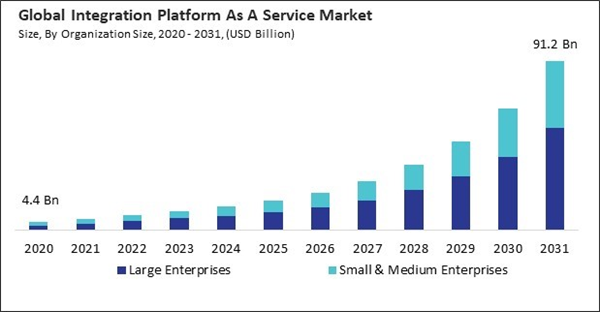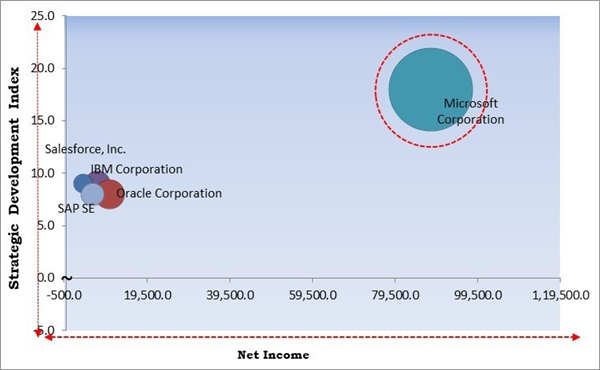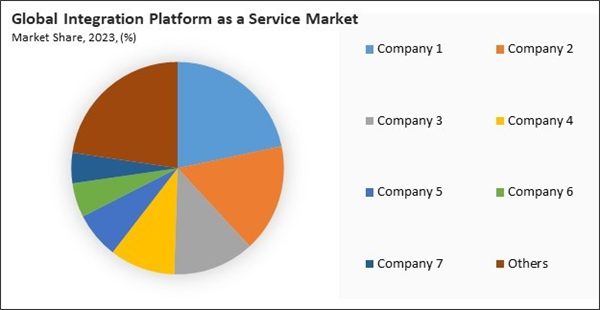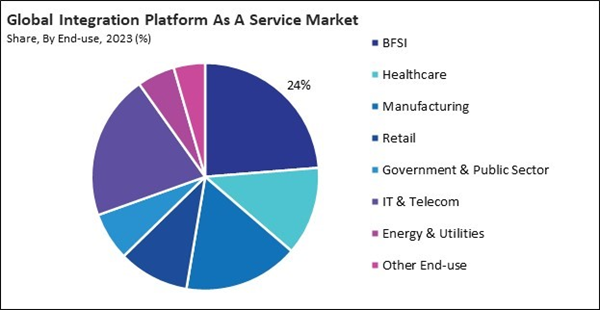The North America segment acquired 39% revenue share in this market in 2023. The regional market's growth is largely due to the region’s strong technological infrastructure and high cloud adoption rate. The presence of major iPaaS providers and a high concentration of enterprises focused on digital transformation have driven demand for integration solutions across various industries, including finance, healthcare, and retail.
The major strategies followed by the market participants are Partnerships as the key developmental strategy to keep pace with the changing demands of end users. For instance, In May, 2024, IBM expanded its partnership with Salesforce, a U.S.-based cloud-based software company specializing in CRM. This collaboration integrates IBM's watsonx AI platform with Salesforce’s Einstein 1 Platform, enabling organizations to leverage pre-built AI actions, prompts, and secure, bidirectional data integration. Moreover, In September, 2024, Salesforce expanded its partnership with Google Cloud, a major cloud computing service provider known for its enterprise solutions and data storage capabilities. This collaboration aims to deliver autonomous AI agents that enhance collaboration across Salesforce Customer 360 and Google Workspace applications. By integrating these technologies, Salesforce seeks to empower customers to deploy agents that seamlessly operate within their daily applications, ensuring robust privacy and user data protection.
KBV Cardinal Matrix - Market Competition Analysis
Based on the Analysis presented in the KBV Cardinal matrix; Microsoft Corporation is the forerunner in the Integration Platform as a Service Market. In April, 2024, Microsoft partnered with Cloud Software Group, a provider of cloud software solutions. This collaboration aims to enhance Citrix's virtual application and desktop platform while fostering the development of integrated cloud and AI solutions, ultimately improving customer experiences and streamlining joint go-to-market activities. Companies such as Oracle Corporation, IBM Corporation and SAP SE are some of the key innovators in Integration Platform as a Service Market.Market Growth Factors
The increasing demand for cloud-based solutions is reshaping how organizations approach their IT infrastructure, driven by flexibility, scalability, and cost-effectiveness. The large upfront expenses that are associated with traditional on-premises infrastructure can be avoided by businesses by scaling resources on demand in a flexible environment that is provided by cloud platforms. Hence, the increasing adoption of cloud will drive the market's growth.Additionally, Digital transformation is rapidly advancing across countries, with each nation adopting digital tools to enhance efficiency, optimize services, and improve user experiences. For instance, Singapore’s Smart Nation initiative uses iPaaS to unify data across urban infrastructure and public services. At the same time, Germany and Japan employ iPaaS in manufacturing, integrating IoT and robotics in smart factories to streamline production and reduce costs. Thus, such factors will aid in the growth of the market.
Market Restraining Factors
However, As data intrusions and cyber threats become increasingly sophisticated and frequent, organizations are understandably hesitant to consider cloud-based integration options. Industries like finance, healthcare, and government are particularly sensitive to these risks because they often handle highly confidential and personal information. A breach within such sectors can have devastating consequences, including financial losses, compromised client trust, and even legal repercussions. Hence, the associated risks of data security and privacy breaches continue to impede the market's growth.The leading players in the market are competing with diverse innovative offerings to remain competitive in the market. The above illustration shows the percentage of revenue shared by some of the leading companies in the market. The leading players of the market are adopting various strategies in order to cater demand coming from the different industries. The key developmental strategies in the market are Partnerships & Collaborations.
Driving and Restraining Factors
Drivers
- Increasing Demand For Cloud-Based Solutions
- Advancement Of Digital Transformation Initiatives Across Countries
- Growing Complexity Of Enterprise IT Environments
Restraints
- Data Security and Privacy Concerns
- High Initial Costs and Resource Requirements
Opportunities
- Rising Adoption Of Microservices and Devops
- Expansion Of API-Based Economy
Challenges
- Lack Of Skilled Workforce
- Significant Performance and Reliability Issues
Organization Size Outlook
By organization size, the integration platform as a service market is bifurcated into small & medium enterprises and large enterprises. The small & medium enterprises segment acquired 38% revenue share in this market in 2023. For the small & medium enterprises (SMEs) segment, the key driving factor is the flexibility and cost-effectiveness of iPaaS. SMEs face resource and budget constraints, which make it challenging to maintain traditional, in-house integration solutions.Deployment Outlook
On the basis of deployment, the integration platform as a service market is divided into public cloud, private cloud, and hybrid cloud. The private cloud segment garnered 26% revenue share in this market in 2023. Private cloud deployments provide the benefits of cloud-based integration while offering greater control over data and infrastructure, essential for sectors like finance, healthcare, and government that handle sensitive information.End-use Outlook
Based on end-use, the integration platform as a service market is segmented into BFSI, energy & utilities, IT & telecom, government & public sector, healthcare, manufacturing, retail, and others. The IT & telecom segment witnessed 21% revenue share in this market in 2023. In the IT & telecom sector, iPaaS adoption is driven by the industry's push for digital transformation, connectivity expansion, and integration of cloud services with legacy systems. Telecom companies benefit from iPaaS by streamlining data management across vast networks and incorporating emerging technologies like IoT and 5G.Type Outlook
Based on type, the integration platform as a service market is classified into cloud service orchestration, data transformation, API management, data integration, real-time monitoring & integration, and others. The data integration segment acquired 22% revenue share in this market in 2023. Data integration is crucial for businesses aiming to eliminate silos, ensure data consistency, and support comprehensive analytics. By automating the data integration process, iPaaS solutions help organizations streamline information flows, enabling better visibility and control over business operations.Market Competition and Attributes
The Integration Platform as a Service (iPaaS) market features a diverse landscape with numerous emerging players and niche providers. This competition fosters innovation, as companies develop specialized solutions to meet specific customer needs. The market is characterized by increasing partnerships, a focus on seamless integrations, and tailored offerings, allowing smaller players to compete effectively against larger organizations and maintain relevance.
By Regional Analysis
Region-wise, the integration platform as a service market is analyzed across North America, Europe, Asia Pacific, and LAMEA. The Asia Pacific segment recorded 27% revenue share in this market in 2023. This growth reflects the rapid digitalization and adoption of cloud technologies in countries like China, India, Japan, and Australia. The emergence of the e-commerce, telecommunications, and manufacturing sectors has prompted numerous businesses in the Asia Pacific region to invest in iPaaS solutions to automate data flows and support complex integrations.Recent Strategies Deployed in the Market
- Oct-2024: SAP SE took over WalkMe, a digital adoption platform company. This acquisition aims to enhance SAP's product offerings by integrating WalkMe's technology, improving user experience across business applications. The integration of WalkMe's AI capabilities is set to boost user productivity through context-aware assistance in SAP's copilot Joule.
- Sep-2024: Salesforce deepens its partnership with IBM, a global technology and consulting company based in Armonk, New York, to deliver advanced AI and autonomous agents aimed at enhancing decision-making, productivity, and efficiency for its customers. This collaboration focuses on enabling organizations in highly regulated industries to leverage their enterprise data effectively.
- Sep-2024: Oracle partnered with Amazon Web Services (AWS), a leading cloud services provider based in Seattle, Washington. This collaboration introduces Oracle Database@AWS, enabling customers to access Oracle Autonomous Database and Oracle Exadata Database Service within AWS. Through this partnership, Oracle aims to simplify the migration and management of enterprise workloads while enhancing agility, flexibility, and security in multi-cloud environments.
- Jul-2024: IBM completed the acquisition of StreamSets and webMethods from Software AG, a Germany-based enterprise software provider, enhancing its Automation and AI portfolios. This acquisition brings real-time data ingestion via StreamSets and comprehensive iPaaS capabilities through webMethods, enabling IBM to offer a robust application and data integration platform for enterprise innovation.
- Apr-2024: Salesforce announced AI-powered enhancements to its MuleSoft platform, a leading provider of automation, integration, and API management solutions. The new features, including Intelligent Document Processing (IDP) and AI integration, aim to improve productivity for business users and developers. By embedding Einstein, Salesforce’s generative AI assistant, into its tools, Salesforce empowers users to automate workflows and build integrations using natural language, streamlining processes across its ecosystem.
List of Key Companies Profiled
- IBM Corporation
- Microsoft Corporation
- Salesforce, Inc.
- Oracle Corporation
- SAP SE
- Informatica Inc.
- Boomi, LP.
- Software AG
- Zapier, Inc.
- SnapLogic Inc.
Market Report Segmentation
By Organization Size- Large Enterprises
- Small & Medium Enterprises
- Public Cloud
- Private Cloud
- Hybrid Cloud
- Cloud Service Orchestration
- Data Transformation
- API Management
- Data Integration
- Real-time Monitoring & Integration
- Other Types
- BFSI
- Healthcare
- Manufacturing
- Retail
- Government & Public Sector
- IT & Telecom
- Energy & Utilities
- Other End-use
- North America
- US
- Canada
- Mexico
- Rest of North America
- Europe
- Germany
- UK
- France
- Russia
- Spain
- Italy
- Rest of Europe
- Asia Pacific
- China
- Japan
- India
- South Korea
- Singapore
- Malaysia
- Rest of Asia Pacific
- LAMEA
- Brazil
- Argentina
- UAE
- Saudi Arabia
- South Africa
- Nigeria
- Rest of LAMEA
Table of Contents
Companies Mentioned
Some of the leading companies profiled in this Integration Platform as a Service Market report include:- IBM Corporation
- Microsoft Corporation
- Salesforce, Inc.
- Oracle Corporation
- SAP SE
- Informatica Inc.
- Boomi, LP.
- Software AG
- Zapier, Inc.
- SnapLogic Inc.













